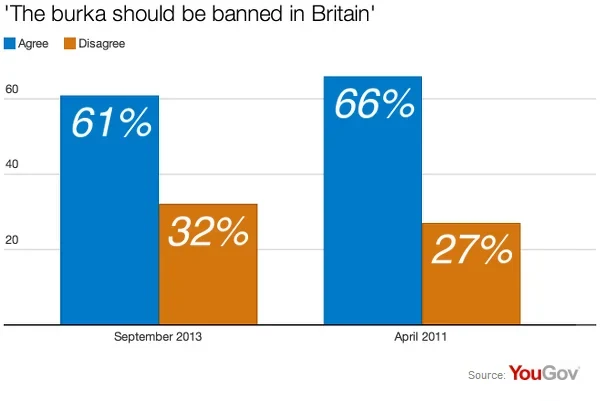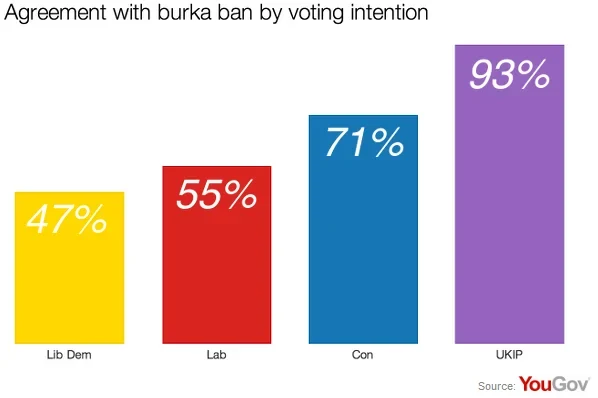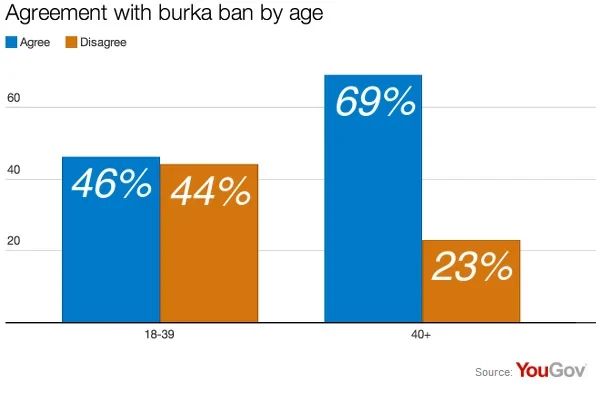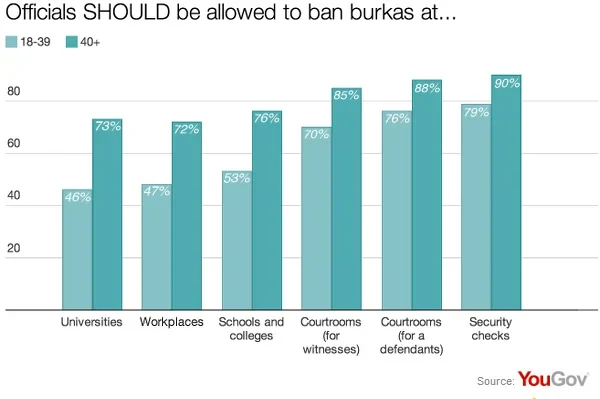61% still want a ban on burkas, a modest decline from 2011 – although the level of support for a ban varies dramatically by voters’ politics and age
Muslim women wearing a veil over their face must remove it to give evidence in court, a judge has ruled. However women will be allowed to wear a veil when standing trial. The ruling comes after the Prime Minister’s office expressed support for allowing schools to ban students from wearing veils. A Muslim veil, also called a burka or a niqab, is a loose garment worm by women in some Islamic traditions for the purpose of hiding a female’s face and body when out in public.
Most Britons would go even further, a YouGov poll for the Sun reveals.
61% of British adults agree with the statement, ‘the burka should be banned in Britain’, while about a third (32%) disagree. This shows a modest decrease in support for the ban compared to 2011, when 66% agreed with the idea and 27% did not.

However feelings vary dramatically across the political spectrum.
While Lib Dem voters are split on the idea of a ban, with 47% agreeing with it and 46% disagreeing, UKIP voters are almost unanimously in favour, by 93% agree to 6% disagree. Conservative voters (71% agree to 26% disagree) and Labour voters (55%-35%) find themselves somewhere in between Lib Dems and UKIP.

It was a Lib Dem Home Office minister, Jeremy Browne, who called for a ban on Muslim veils in schools before Downing Street commented on the matter.
Generational divide
YouGov’s poll also appears to show that different groups view the issue of a blanket ban on veils very differently.
Under 40s, for instance are much less likely to agree with the ban than their elder counterparts. Where as the younger group is more or less split on the issue (46% agree with it; 44% disagree), the older group is decisively in favour of it (69% agree; 23% disagree).

On the issue of allowing specific bans in circumstances like the ones described above – such as on women in court as witnesses or defendants – Britons overwhelmingly favour allowing officials to institute a ban.
Here the differences between voters of different ages became more clear, while political differences were less stark.
Younger voters tend to be much less supportive of allowing officials to ban burkas in everyday circumstances – such as at schools, universities and work places – whereas they are more in agreement with older voters when it comes to special circumstances like court proceedings or security checks (such as at the airport).

Casting some light on their resistance to bans in special circumstances, half (50%) of under 40s agreed with the libertarian statement that people should be allowed to wear whatever they want ‘so long as the are not harming anyone else’. Only a third (32%) of over 40s agreed with the same statement.
Earlier this week Birmingham Metropolitan College announced they would be reversing a ban on full-face veils after claims of discrimination by a 17-year-old prospective student led to a sustained campaign against the policy.
Image: Getty







